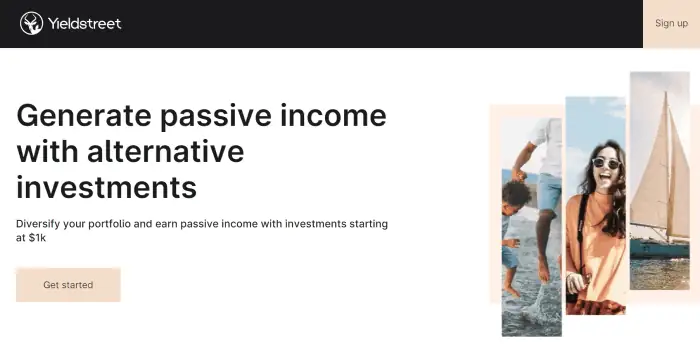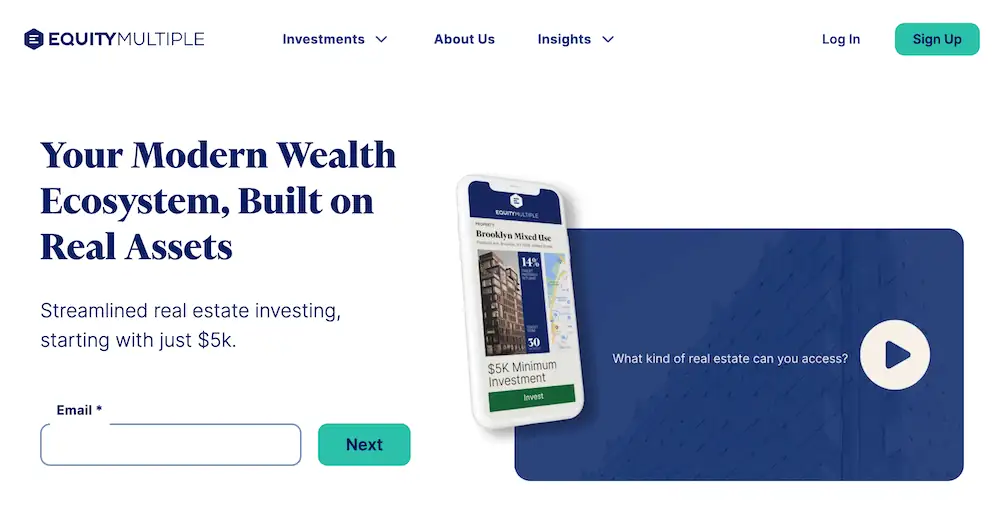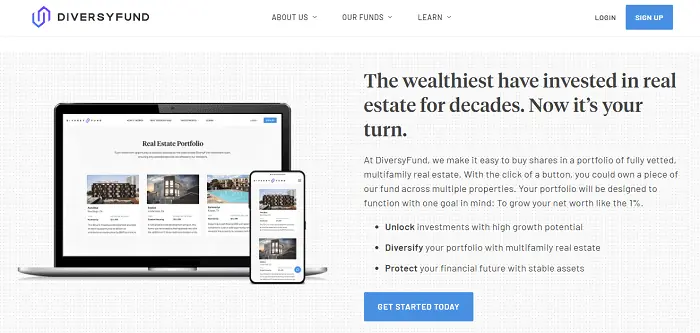Ninety percent of millionaires build their wealth through real estate, or at least that’s what billionaire Andrew Carnegie once famously said. And that’s part of why owning a home is such a staple of the American Dream. Unfortunately, supply-chain disruptions, historically low interest rates, and lack of inventory have resulted in a meteoric rise in the price of real estate over the past few years, leaving many prospective homebuyers on the sidelines.
The good news? You don’t need a hefty down payment or a low debt-to-income ratio to invest in real estate. You don’t even need to mow the lawn or repair leaky toilets.
All you need is a few hundred dollars.
Establishing a real estate portfolio has never been easier thanks to real estate crowdfunding platforms. Read on to learn about the best real estate crowdfunding options.
Best Real Estate Crowdfunding Platforms for Accredited Investors—Top Picks
|
Primary Rating:
4.7
|
Primary Rating:
4.6
|
Primary Rating:
4.4
|
|
Minimum investment: $500. Fees vary by offering.
|
Minimum Investment: $5,000. Fees vary by offering, but typically are 1%.
|
Minimum Investment: $50,000. Fees vary by offering.
|
Best Ways to Access Real Estate Crowdfunding for Accredited Investors
Accredited investors are those with a high net worth or a high income, either individually or combined with a spouse. Even with significantly higher income or net worth, however, these individuals might prefer to forego the trials of a landlord by crowdfunding.
If you’re an accredited investor, here are the best real estate crowdfunding platforms for you:
1. Yieldstreet (Real estate investments and alternatives)

- Minimum Investment to Start: $2,500
- Type of Real Estate Investment: Broad real estate (also includes alternatives)
- Type of Investor: All investors
- Available: Sign up here
Alternative investments—basically, any asset that falls outside of stocks, bonds or cash—have become increasingly popular as fintech services open up previously closed markets to the individual retail investor. These opportunities have democratized numerous markets and unlocked previously inaccessible cash flows to pad your income.
Yieldstreet is one such platform, providing access to income-generating assets across several asset classes.
Yieldstreet is an alternative investment platform that provides you with income-generating opportunities. These investment options come backed by collateral, typically have low stock market correlation, and span various asset classes. Such asset classes include:
- Art finance
- Real estate
- Commercial finance
- Legal finance
- And more
Yieldstreet, which has been in business since 2015, has returned more than $600 million to its investors since its founding.
Historically, annual returns range anywhere from 3% to 18%, depending on the goal-based strategy. Yieldstreet offers predefined payment schedules (e.g., monthly or quarterly payments), and they may pay principal and interest upon the occurrence of certain events, such as settlement within a legal finance investment.
The durations of investment opportunities range from three months to seven years. Investment minimums start as low as $2,500, but can go well into five digits.
Yieldstreet technically is open to all investors, as non-accredited and accredited investors alike can participate in the Yieldstreet Prism Fund. However, you must be an accredited investor to participate in all other Yieldstreet offerings.
Learn more, and consider accessing these passive income investments, by opening an account today.
- Yieldstreet offers portfolio diversification through building passive income streams with alternative investments
- Typically have low stock market correlation
- Have short durations (6 months to 5 years)
- Low minimums (as low as $2,500)
- Backed by collateral to help protect your principal (over $600m in principal and interest payments returned to investors since 2015)
- Access to several alternative asset classes
- Low stock market correlation
- Low minimums compared to other accredited investment platforms
- Illiquid investments
- Some investments have lost money
- Most investments only available to accredited investors
Related: 15 Best High-Yield Investments [Safe Options Right Now]
2. EquityMultiple (Commercial real estate crowdfunding)

- Minimum Investment to Start: $5,000
- Type of Real Estate Investment: Commercial real estate
- Type of Investor: Accredited investors only
- Available: Sign up here
Some real estate crowdfunding platforms only allow you to invest in property portfolios. However, some platforms, such as EquityMultiple, also allow you to invest in individual properties—in this case, commercial real estate (CRE).
EquityMultiple carries a minimum $5,000 initial investment and comes with a limitation on the type of investors who can participate: accredited investors. However, those investors have access to individual commercial real estate deals, funds, and even diversified short-term notes.
For those interested in learning more about EquityMultiple, consider signing up for an account and going through their qualification process.
- EquityMultiple is a commercial real estate platform for accredited investors, providing investment opportunities in real estate funds, individual properties, and savings alternatives.
- EquityMultiple has a team boasting decades of real estate transaction experience. Their due diligence process whittles down a large selection of properties, accepting only 5% as target investments that they use to build a variety of portfolios that suit numerous investing objectives.
- The company has made $379 million in distributions since its founding.
- Makes commercial real estate Investments accessible
- Intuitive website design
- High net total returns and distributions paid to investors
- Only available to accredited investors
- High investment minimum to begin
- Fee structure varies by investment, complex at times
Related: 9 Best Tax-Advantaged Investments & Accounts to Build Wealth
3. CrowdStreet (Commercial real estate crowdfunding platform)

- Minimum Investment to Start: $25,000
- Type of Real Estate Investment: Commercial real estate
- Type of Investor: Accredited investors only
- Available: Sign up here
CrowdStreet is a real estate investment platform available only to accredited investors, and is meant for those looking to invest in CRE for long periods.
While its investments have performed well, they’re fairly illiquid. Illiquid investments require you to commit money for at least a few years—Crowdstreet notes that “sponsors generally target a hold period of 3-5 years, although some investments target as long as 10 years”—forcing you to leave your money tied up in these investments.
Further, CrowdStreet comes with a high investment minimum of $25,000, though higher minimums are more typical for platforms that cater to accredited investors. (Meanwhile, platforms that allow non-accredited investors to participate usually have lower minimums.)
Depending on the type of project chosen, you might receive returns via quarterly dividends on the commercial rental properties, or you might receive a share of profits only when the investment property is sold—or you might receive both.
If you’re an accredited investor, you can visit CrowdStreet to learn more about the types of investments and sign up.
Editor’s note: Bloomberg has recently reported that investment funds in CrowdStreet allegedly have gone missing. According to court papers, millions of dollars ended up in accounts owned by Nightingale Properties, which CrowdStreet partnered with on the affected real estate transactions. CrowdStreet alerted regulators and brought in an independent manager to determine how the funds went missing. We are monitoring this developing story and may update our recommendations depending on the outcome.
- CrowdStreet is a real estate investment platform available exclusively to accredited investors looking to invest in commercial real estate for long periods.
- CrowdStreet comes with a high minimum investment of $25,000.
Related: Real Estate Syndication: What It Means and How to Invest
Best Platforms for Private Equity Real Estate
If you are an accredited investor, you have a few options for investing solely in “private placements,” which are private real estate investments between two or more parties. In other words, you’re investing in individual properties, though these platforms typically allow investors to invest in multiple individual properties simultaneously, which provides some diversification.
4. First National Realty Partners (Grocery-anchored commercial real estate)

- Minimum Investment to Start: $50,000
- Type of Real Estate Investment: Grocery-anchored commercial real estate
- Type of Investor: Accredited investors only
- Available: Sign up here
First National Realty Partners (FNRP) is one of the fastest-growing vertically integrated CRE investment firms in the United States. It’s also focused on a very particular niche: grocery-anchored commercial real estate.
FNRP’s team leverages relationships with top-tier national-brand tenants—including Kroger, Walmart, and Whole Foods—to provide investors with access to institutional-quality CRE deals both on- and off-market. Unlike many of the other sites on this list, which are equity crowdfunding platforms, FNRP offers private placements that only an accredited investor can access.
They’ve helped thousands of investors increase their net worth and diversify their portfolios against market volatility through deals that yield steady cash flow.
FNRP also progresses from an entire investment lifecycle, from acquisition through disposition, 100% in-house. A large team of professionals filters through thousands of deals to choose a handful they believe will outperform their peers.
Unlike a traditional real estate investment trust (REIT) or fund, you have the ability to pick the deals that best align with your investment needs, so you can use FNRP’s various offerings to build your own portfolio.
This relative exclusivity does, however, come with a high minimum investment of $50,000. Sign up to learn more about the opportunity and determine whether it makes sense for your investment goals.
- FNRP is the leading sponsor for grocery-anchored commercial real estate.
- FNRP has a nationwide focus and leverages relationships with the best national-brand tenants to bring accredited investors exclusive access to institutional-quality deals.
- FNRP provides partners with institutional-quality investments that achieve exceptional, risk-adjusted returns (12%-18% targeted average annual returns, of which, 8% is the targeted average annual cash distribution.)
- Uses the Dragnet Acquisitions Model - strong due diligence. FNRP looks at 1,000 deals and chooses just one. FNRP chooses only the best deals they believe offer the highest return for the absolute lowest risk.
- FNRP's entire investment cycle is 100% in-house and not outsourced like traditional private equity sponsors.
- Strong performance track record
- Unique investment niche (grocery-anchored CRE)
- High total shareholder return
- Only accessible to accredited investors
- High investment minimum ($50,000)
Related: First National Realty Partners Review: Grocery-Anchored Deals
Best Real Estate Crowdfunding Platforms for Non-Accredited Investors—Top Picks
|
Primary Rating:
4.6
|
Primary Rating:
4.5
|
Primary Rating:
4.1
|
|
Minimum Investment: $10; 1.00% in annual fees (servicing and management)
|
Minimum Investment: $10. No fees.
|
Minimum Investment: $5,000. Fees vary by offering.
|
Best Ways to Access Real Estate Crowdfunding for Non-Accredited Investors
If you’re a non-accredited investor, fear not—there are many great options available to everyday investors looking to get started investing in real estate. Below are the best real estate crowdfunding investment opportunities for non-accredited investors.
5. Fundrise (Debt + equity real estate investing portfolios)

- Minimum Investment to Start: $10
- Type of Real Estate Investment: Residential and commercial real estate
- Type of Investor: All investors
- Available: Sign up here
Fundrise provides diversification by allowing its investors to access several funds, each of which holds a number of properties and is designed to provide varying levels of risk and income.
This popular real estate investment platform offers numerous options, including:
- Starter and Basic accounts: Investors can now access Fundrise for as little as $10. People who open a Starter account ($10-plus minimum investment) or Basic account ($1,000-plus) have their money automatically invested in the Flagship Real Estate Fund, which seeks a balanced objective of income and growth.
- Core, Advanced, and Premium accounts: Core ($5,000-plus), Advanced ($10,000-plus), and Premium ($100,000-plus) accounts all have access to more specialized strategies. The four primary funds, from low risk/income to high risk/income, are Fixed Income, Core Plus, Value Add and Opportunistic. These accounts also have varying amounts of access to Fundrise’s “eREITs.” Also, Advanced and Premium accounts may invest in the Fundrise eFund, which is a tax-efficient partnership that can also hold non-REIT-eligible assets with “unique potential.”
- Fundrise iPO: This “internet public offering” allows investors to buy a stake in Fundrise’s parent company, Rise Companies Corp.
- Innovation Fund: This fund does not invest in properties, but rather private high-growth technology companies. While the fund expects to focus primarily on late-stage companies, it can hold early- and late-stage private companies, as well as some public equities. (Fundrise would likely invest in these publicly traded companies prior to their IPO, or initial public offering.)
You do not need to be an accredited investor to invest in Fundrise, but several of its funds are closed to non-accredited investors.
Learn more about Fundrise, including its various tiers, to determine what level of investing is best for you.
- Regardless of your net worth, you can now benefit from real estate’s unique potential for generating consistent cash flow and long-term gains with Fundrise starting as low as $10.
- Enjoy set-it-and-forget-it managed portfolios with standard Fundrise accounts, or actively select the funds you want to invest in with Fundrise Pro.
- Diversify your portfolio with real estate, private tech investing, or private credit.
- Low minimum investment ($10)
- Accredited and non-accredited investors welcome
- IRA accounts available
- Highly illiquid investment
Related: 15 Best Stock Market Investing Research & Analysis Sites
6. RealtyMogul (CRE + residential real estate for non-accredited + accredited investors)

- Minimum Investment to Start: $5,000
- Type of Real Estate Investment: Commercial and residential real estate
- Type of Investor: All investors
- Available: Sign up here
RealtyMogul is an online real estate crowdfunding marketplace that primarily offers opportunities in CRE and residential properties. The company caters to individuals seeking institutional-quality real estate investments.
The company offers two private REITs that are open to accredited and non-accredited investors alike. If you’re an accredited investor, you can also participate in RealtyMogul’s private placements.
When you participate in private placement opportunities through RealtyMogul, you can choose to invest through fractional ownership in an individual property or a group of properties.
Investors who prefer to invest through REITs have two options at RealtyMogul:
- The Income REIT: Pays monthly dividends at a 6% to 8% annualized rate (net of annual management fee) and focuses on income-generating assets more than growth-oriented investments. This fund invests in CRE investment options such as office buildings and retail space, and residential real estate investment options such as multifamily properties.
- The Apartment Growth REIT: A more balanced approach between income and growth, this REIT offers the ability to earn passive income at a lower annualized rate than the monthly dividends from The Income REIT, but with an eye toward capital appreciation as well. This fund’s holdings differ from Income REIT, opting to invest solely in residential apartment buildings.
RealtyMogul charges a 1% annual management fee for Income REIT and a 1.25% annual management fee for Apartment Growth REIT. Other fees might apply.
Learn more about RealtyMogul by visiting their site.
- RealtyMogul is an online real estate crowdfunding marketplace for real estate investing
- RealtyMogul specializes in commercial real estate and private real estate assets
- The service has a $5,000 minimum investment threshold and offers two REITs aimed at different investment objectives: The Income REIT and The Apartment Growth REIT
Related: 10 Best Stock Advisor Websites & Services to Seize Alpha
7. Groundfloor (“Fix-and-flips”)

- Minimum Investment to Start: $1,000
- Type of Real Estate Investment: Residential real estate
- Type of Investor: All investors
- Available: Sign up here
Groundfloor offers short-term, high-yield real estate debt investments to the general public.
The service provides short-term loans (three to 18 months) to entrepreneurs working on “fix-and-flips” (aka “fixer-uppers”). Then it allows member investors to invest in that debt.
Thus, if you are interested in the financial potential of fixer-uppers, but you’re not exactly handy nor do you know much about buying and selling actual properties, Groundfloor is a way you can still participate.
The service aims to make an asset class otherwise inaccessible to the general public. It averages 10% returns annually, though investors do need $1,000 to begin on the platform.
- Groundfloor is a crowdsourced real estate investing platform which offers high-yield, short-term real estate debt investments.
- Offers collateralized, secured real estate debt with 1-month, 3-month, and 12-month terms.
- Has delivered consistent 10%+ returns over past eight years with repayments received in 6-9 months on average.
- Offers after-tax and IRA investment options.
- Special offer: When you sign up with our link, create your account and transfer your first $100, you'll receive a $100 credit to invest on Groundfloor.*
Related: 18 Passive Income Apps that Give & Make You Money
8. DiversyFund (Multifamily units)

- Minimum Investment to Start: $500
- Type of Real Estate Investment: Commercial and multifamily residential real estate
- Type of Investor: All investors
- Available: Sign up here
The DiversyFund platform caters to individuals looking to invest in multifamily residential units, such as apartment buildings.
The service targets properties it believes will appreciate with the help of additional investment after purchase. They renovate properties with a medium-term time horizon (roughly 5 years) and flip them to other investors.
Instead of serving as a broker that connects investors with projects, DiversyFund follows a different model it believes provides more value to individual investors who use the platform: It conducts due diligence, buys, develops, and manages a portfolio of apartment complexes in-house.
In so doing, it collects the cash flow to reinvest in the properties, returns some to individual investors, then divides the profits at the time of sale (often five years after acquisition).
This model yields investors cash returns while invested and a capital gain once sold.
DiversyFund has developed expertise in the multifamily real estate market, targeting apartment complexes containing 100 to 200 units that produce monthly cash flow.
You can start investing in one of DiversyFund’s portfolios for as little as $500.
- DiversyFund targets multifamily properties between 100-200 units with positive cash flow.
- The company reinvests these funds into renovations to improve the property and resell it in ~5 years at an appreciated value.
- Look at the the Growth REIT investment w/$500 min.
- Makes apartment investing accessible
- Low investment minimum ($500)
- Long holding period (~5 years)
Related: 11 Best Commission-Free Stock Trading Apps & Platforms
Related Questions on Real Estate Crowdfunding Platforms

What is crowdfunding?
Crowdfunding is a way to raise money from relatively small individual investments or contributions from a large number of people. In the case of real estate: non-accredited (retail) or accredited investors.
What are real estate crowdfunding platforms?
Real estate crowdfunding platforms allow investors to pool their money with others to purchase property outright or shares of a property (either common or preferred equity), or to lend money secured by the property as a group.
Property owners can leverage equity and debt capital offered by platforms’ investor bases to finance development costs, renovations, ongoing operations and maintenance expenses, and more.
Access to this style of investing is relatively new. After passage of the Jumpstart Our Business Startups Act (JOBS Act) of 2012, small business startups, companies, and investment platforms gained new ways to raise capital through crowdfunding platforms.
Specifically, the JOBS Act made it easier for retail investors to invest not only in startups, but real estate as well through real estate crowdfunding deals and crowdfunding platforms.
The Securities and Exchange Commission (SEC) doesn’t regulate crowdfunded investments the same way they do securities issued to the public on an open market. These assets typically are less regulated and scrutinized.
As such, crowdfunded investments might carry more risk—something that should factor into your investment decision.
A real estate crowdfunding platform can come in two flavors:
1. Equity crowdfunding platforms
Investing in the equity of a real estate offering makes you a shareholder in a specific property or portfolio of properties. Your stake is proportionate to the amount of money you’ve invested in the equity or preferred equity of the property.
With equity crowdfunding platforms, you realize gains through rental income generated from the property, less any operational and service fees. At disposition of the property, you might also receive a share of any appreciation value if sold for a gain.
You can realize tax benefits through claiming accelerated depreciation to lower any rental income received from your share of the property.
2. Debt crowdfunding platforms
Different from equity crowdfunding platforms, debt crowdfunding platforms allow you to act as a lender to the property owner or the deal sponsor.
Your loan is secured by the underlying property or property portfolio, granting you a fixed rate of return determined by the interest rate on the loan and how much you’ve invested in the deal.
These investments tend to carry shorter holding periods, steadier income, and lower risk due to your higher position in the capital stack (the various forms of capital used to buy and operate real estate) and ability to secure the loan with the property.
Is crowdfunding good for investors, and what are the risks?
One major difference between investing through a crowdfunding platform and an open market is the different types of risk involved. Some of the primary risks faced by a non-accredited investor as well as an accredited investor interested in crowdfunding investing include:
Speculative
Investments in private deals can be speculative and entail significant risk. Single-asset entities or even portfolio investments can fail despite the best of intentions.
You may invest in a property in a mature, stable market, but still face uncertainty thanks to changing market conditions.
Illiquid
Investments made on crowdfunding platforms often entail a longer-term commitment, typically ranging from six months to five years, depending on the nature of your investment and the terms of the deal.
Make sure the money you invest isn’t needed for near-term expenses, as your money might be locked up in the crowdfunded investment for an extended period of time.
Valuation and capitalization
Your investment might be valued inappropriately due to any number of factors. Further, your investment might represent a small portion of the overall capitalization of the real estate investments.
Depending on the nature of your investment, you might not have legal claim to the underlying property or assets should it face insolvency or financial hardship. Do your due diligence before proceeding with any service provider in the space.
Lower disclosure requirements
Public companies must disclose all financial, operational, and market information to prospective investors.
Crowdfunding companies might disclose this info as well, but they have no significant obligation to disclose all pertinent investment information to potential investors.
Lack of professional guidance
Unlike the funding and guidance offered by professional, early-stage investors (e.g., angel investors and venture capitalists), these platforms merely serve as a means for connecting investors with investment opportunities.
Can investors make money from crowdfunding real estate investments?
Investors can make money from these crowdfunding platforms, but the money made and how frequently it is earned will depend upon the type of investment.
Some investment options are focused on supplemental income and pay regular dividends, while others are focused on the growth and appreciation of the properties in the portfolio and have a longer timeline for payout.
Potential investors should always do their own due diligence and ensure they understand what they are investing in before committing funds.
For example, while some platforms grade investment opportunities in terms of risks, you shouldn’t take these grades as investment advice.
It is also important to diversify your investments and to not place your entire investment portfolio in one asset class.
Related:














![10 Best Investments for Roth IRA Accounts [Tax-Smart Growth] 61 best investments for roth ira](https://youngandtheinvested.com/wp-content/uploads/best-investments-for-roth-ira.webp)
![How to Use Your HSA for Retirement [Tax-Efficient Investing Tool] 62 how to use your HSA in retirement](https://youngandtheinvested.com/wp-content/uploads/how-to-use-your-hsa-in-retirement-600x403.png.webp)
